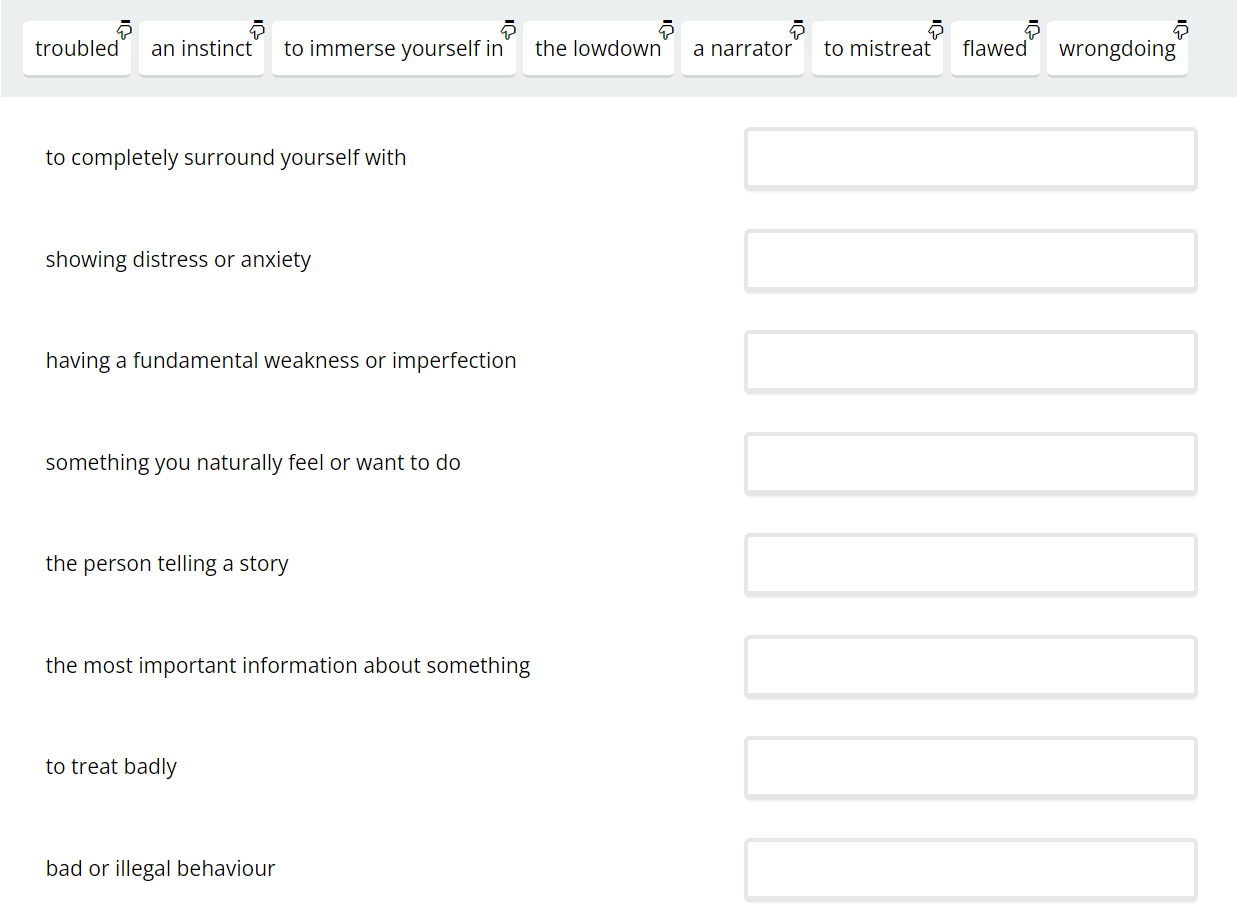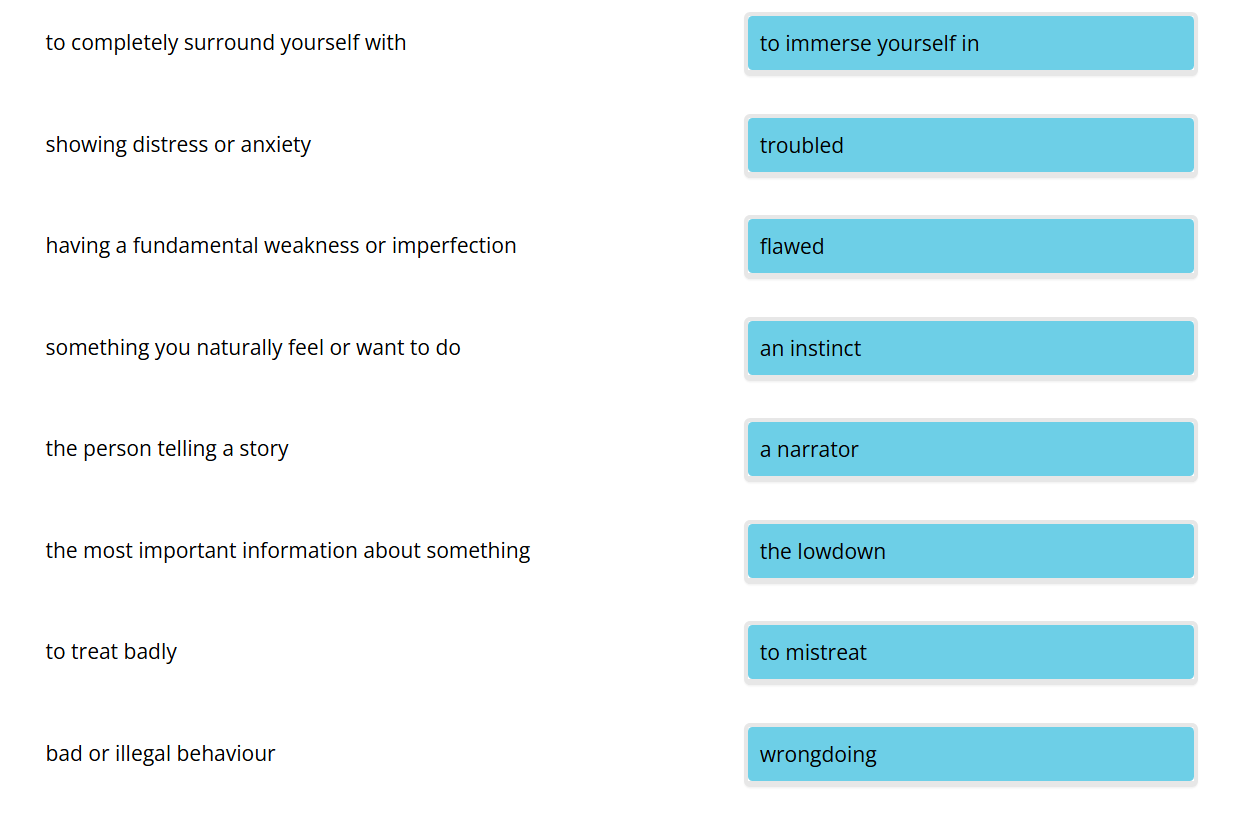【C1-Listening】03 An interview about two books-关于两本书的采访
【C1-Listening】03 An interview about two books-关于两本书的采访

Listen to an interview about two books to practise and improve your listening skills.聆听有关两本书的采访,以练习和提高您的听力技巧。
Do the preparation task first. Then listen to the audio and do the exercises.先做好准备工作。然后听音频并做练习。
Preparation准备
A project management meeting – preparation
Match the words with the definitions.
- Question
Vocabulary
1.flawed
2.a narrator
3.troubled
4.to immerse yourself in
5.to mistreat
6.an instinct
7.wrongdoing
8.the lowdown
Definition
a. to completely surround yourself with
b. showing distress or anxiety
c. having a fundamental weakness or imperfection
d. something you naturally feel or want to do
e. the person telling a story
f. the most important information about something
g. to treat badly
h. bad or illegal behaviour

- Answer
- to completely surround yourself with
to immerse yourself in- showing distress or anxiety
troubled- having a fundamental weakness or imperfection
flawed- something you naturally feel or want to do
an instinct- the person telling a story
a narrator- the most important information about something
the lowdown- to treat badly
to mistreat- bad or illegal behaviour
the lowdown
Sure, here are the translations:
- To completely surround yourself with
完全沉浸在
To immerse yourself in
沉浸于- Showing distress or anxiety
显示出痛苦或焦虑
Troubled
困扰的- Having a fundamental weakness or imperfection
有根本性的缺陷或不完美
Flawed
有缺陷的- Something you naturally feel or want to do
你自然感到或想要做的事情
An instinct
本能- The person telling a story
讲故事的人
A narrator
叙述者- The most important information about something
关于某事最重要的信息
The lowdown
实情- To treat badly
虐待
To mistreat
虐待- Bad or illegal behaviour
不良或非法行为
The lowdown
黑幕

Transcript
English
Presenter: Today we’re looking at the darker side of literature with two books about not-so-happy families. And we’ve got writer Helen Slade and book critic Anna Kimura to talk us through them. First up, we’re looking at Her Mother’s Daughter by Alice Fitzgerald, a novel written from two points of view, one of a child and the other of her very troubled mother. Helen, I have to be honest. I found this one hard to read. It’s very well written but, well, how did you find it?
Helen: I know what you mean, but I literally couldn’t put it down and stayed up till three in the morning to finish it. There’s something about immersing yourself in a family this flawed, this damaged, that’s compelling. You’d never want to be in that family yourself, but that’s what reading is about, isn’t it? Wearing someone else’s shoes for a while without ever having to live their reality.
Presenter: You surprise me! The families in your own books are a million miles away from this one.
Helen: Yeah, my readers can always be sure they’re going to get a happy ending. Which you definitely … I don’t want to give too much away here, but you definitely don’t feel like a happy ending is coming for these characters.
Presenter: OK, so don’t mention the ending, but can you just describe for listeners what the book is about?
Helen: So, it’s about a family with secrets. The mother has hidden her troubled childhood from her husband and her two children but, of course, it’s shaped her entire personality and how she behaves as a mother and as a wife. Which is especially obvious when we’re reading the sections told in the child’s voice, even though the little girl herself doesn’t understand the meaning of everything she’s seeing.
Presenter: For me, what was really so shocking was less what happened to the mother when she was a child but how the mother treated her own children. Why is that, do you think?
Helen: I think we’re all programmed to see mothers as something sacred and pure. As a child she was mistreated by her father, and in some ways we’re not that shocked by that, which is a sad thing in itself, and her own mother didn’t help her. As a reader we’re less affected by that, I think, because that part of the story is revealed to us in the mother’s voice, the adult voice. But the reason the way she treats her own child is so much more shocking is that the child is telling us about it and we sympathise with her. It’s very clever how the author plays on our natural instincts to protect a child.
Presenter: Though we do feel sorry for the mother too. Or, at least, I did.
Helen: It’s hard not to. She’s trapped in her own unhappiness.
Presenter: And we’re trapped right there with her as the reader. It made me wonder, Anna, why is it that miserable books like this one sell so well?
Anna: Because all of us have families. I suppose the books play out things we all see in much smaller ways in our own family lives.
Presenter: The other hard-hitting book this week is We Need to Talk About Kevin by Lionel Shriver. Now there’s a family who have a problem!
Anna: They definitely do. Very few people will ever have a killer as a teenage son like the narrator in the book, but we can all identify with the challenges and often terrifying reality of raising teenagers!
Presenter: So can you give us the lowdown on Kevin, then, Anna?
Anna: This book is written from the point of view of the mother in letters she’s writing to her husband, Kevin’s father. Again, we shouldn’t say too much about the ending, but the way the author uses the letters is very clever.
Presenter: I have to admit, I really enjoyed this book. It’s a difficult topic, but it was much easier to read than Her Mother’s Daughter.
Anna: As Helen said before, it’s about the voice of the narrator. There’s no child’s voice and, in this story, the victims in many ways are the adults, though, of course, Kevin’s sister is a victim of her brother’s evil.
Helen: Yes, and the idea of where ‘evil’ comes from is a theme that comes out in both books. If you choose to call it ‘evil’ that is. I prefer to describe it as a complete lack of empathy. The mother in Her Mother’s Daughter had a terrible childhood, but Kevin’s from a happy home and good parents.
Presenter: Is he though? The mother often admits she found motherhood hard. Aren’t we supposed to think she might have caused Kevin to turn out the way he does? Just like in Her Mother’s Daughter.
Anna: Both books certainly look at how the mistakes of the parents affect children. And this is another reason we relate to these books. Parents are always worrying if they’re doing a good job.
English-Chinese
Presenter: Today we’re looking at the darker side of literature with two books about not-so-happy families. And we’ve got writer Helen Slade and book critic Anna Kimura to talk us through them. First up, we’re looking at Her Mother’s Daughter by Alice Fitzgerald, a novel written from two points of view, one of a child and the other of her very troubled mother. Helen, I have to be honest. I found this one hard to read. It’s very well written but, well, how did you find it?
主持人:今天我们将通过两本关于不那么幸福的家庭的书来探讨文学的阴暗面。 我们邀请了作家海伦·斯莱德和书评家安娜·木村来为我们讲述这些故事。首先,我们看的是爱丽丝·菲茨杰拉德的《她母亲的女儿》,这是一本从两个角度写的小说,一个是一个孩子,另一个是她陷入困境的母亲。海伦,我必须说实话。我发现这一篇很难读。写得很好,但是,你是怎么找到它的?Helen: I know what you mean, but I literally couldn’t put it down and stayed up till three in the morning to finish it. There’s something about immersing yourself in a family this flawed, this damaged, that’s compelling. You’d never want to be in that family yourself, but that’s what reading is about, isn’t it? Wearing someone else’s shoes for a while without ever having to live their reality.
海伦:我知道你的意思,但我确实无法放下它,直到凌晨三点才完成它。让自己沉浸在一个如此有缺陷、如此受损的家庭中,这是令人着迷的。你永远不想自己成为那个家庭的一员,但这就是阅读的意义,不是吗?暂时穿着别人的鞋子,却不必生活在现实中。Presenter: You surprise me! The families in your own books are a million miles away from this one.
主持人:你让我很惊讶!你自己书中的家庭与这个家庭相距一百万英里。Helen: Yeah, my readers can always be sure they’re going to get a happy ending. Which you definitely … I don’t want to give too much away here, but you definitely don’t feel like a happy ending is coming for these characters.
海伦:是的,我的读者总是可以确信他们会得到一个幸福的结局。你肯定……我不想在这里透露太多,但你绝对不觉得这些角色会有一个幸福的结局。Presenter: OK, so don’t mention the ending, but can you just describe for listeners what the book is about?
主持人:好的,所以先不提结局,但您能为听众描述一下这本书的内容吗?Helen: So, it’s about a family with secrets. The mother has hidden her troubled childhood from her husband and her two children but, of course, it’s shaped her entire personality and how she behaves as a mother and as a wife. Which is especially obvious when we’re reading the sections told in the child’s voice, even though the little girl herself doesn’t understand the meaning of everything she’s seeing.
海伦:所以,这是关于一个有秘密的家庭的故事。这位母亲向她的丈夫和两个孩子隐瞒了她坎坷的童年,但这当然塑造了她的整个性格以及她作为母亲和妻子的行为方式。当我们阅读孩子的声音讲述的部分时,这一点尤其明显,尽管小女孩自己并不理解她所看到的一切的含义。Presenter: For me, what was really so shocking was less what happened to the mother when she was a child but how the mother treated her own children. Why is that, do you think?
主持人:对我来说,真正令人震惊的不是这位母亲小时候发生的事情,而是这位母亲如何对待自己的孩子。你认为这是为什么呢?Helen: I think we’re all programmed to see mothers as something sacred and pure. As a child she was mistreated by her father, and in some ways we’re not that shocked by that, which is a sad thing in itself, and her own mother didn’t help her. As a reader we’re less affected by that, I think, because that part of the story is revealed to us in the mother’s voice, the adult voice. But the reason the way she treats her own child is so much more shocking is that the child is telling us about it and we sympathise with her. It’s very clever how the author plays on our natural instincts to protect a child.
海伦:我认为我们生来就将母亲视为神圣而纯洁的事物。小时候,她受到父亲的虐待,从某些方面来说,我们对此并不感到震惊,这本身就是一件悲伤的事情,而且她自己的母亲也没有帮助她。我认为,作为读者,我们受此影响较小,因为故事的这一部分是通过母亲的声音,成人的声音向我们揭示的。但她对待自己孩子的方式之所以如此令人震惊,是因为孩子告诉我们这件事,我们同情她。作者非常聪明地利用了我们保护孩子的本能。Presenter: Though we do feel sorry for the mother too. Or, at least, I did.
主持人:虽然我们也为母亲感到难过。或者,至少,我做到了。Helen: It’s hard not to. She’s trapped in her own unhappiness.
海伦:很难不这样做。她陷入了自己的不幸之中。Presenter: And we’re trapped right there with her as the reader. It made me wonder, Anna, why is it that miserable books like this one sell so well?
主持人:我们被困在那里,她是读者。这让我想知道,安娜,为什么像这样一本悲惨的书卖得这么好?Anna: Because all of us have families. I suppose the books play out things we all see in much smaller ways in our own family lives.
安娜:因为我们都有家庭。我想这些书以更小的方式展现了我们在自己的家庭生活中看到的事情。Presenter: The other hard-hitting book this week is We Need to Talk About Kevin by Lionel Shriver. Now there’s a family who have a problem!
主持人:本周另一本热门书籍是莱昂内尔·施赖弗 (Lionel Shriver) 所著的《我们需要谈谈凯文》。现在有一个家庭遇到了问题!Anna: They definitely do. Very few people will ever have a killer as a teenage son like the narrator in the book, but we can all identify with the challenges and often terrifying reality of raising teenagers!
安娜:他们确实这么做了。很少有人会像书中的叙述者一样,在青少年时期拥有杀手,但我们都可以体会到抚养青少年所面临的挑战和常常令人恐惧的现实!Presenter: So can you give us the lowdown on Kevin, then, Anna?
主持人:安娜,您能给我们介绍一下凯文的内幕吗?Anna: This book is written from the point of view of the mother in letters she’s writing to her husband, Kevin’s father. Again, we shouldn’t say too much about the ending, but the way the author uses the letters is very clever.
安娜:这本书是从母亲的角度写的,写给她的丈夫,也就是凯文的父亲。再说一次,我们不应该对结局说太多,但作者使用字母的方式非常聪明。Presenter: I have to admit, I really enjoyed this book. It’s a difficult topic, but it was much easier to read than Her Mother’s Daughter.
主持人:我必须承认,我真的很喜欢这本书。这是一个很难的话题,但比《她母亲的女儿》容易读得多。Anna: As Helen said before, it’s about the voice of the narrator. There’s no child’s voice and, in this story, the victims in many ways are the adults, though, of course, Kevin’s sister is a victim of her brother’s evil.
安娜:正如海伦之前所说,这是关于叙述者的声音。没有孩子的声音,在这个故事中,受害者在很多方面都是成年人,当然,凯文的妹妹是她哥哥邪恶的受害者。Helen: Yes, and the idea of where ‘evil’ comes from is a theme that comes out in both books. If you choose to call it ‘evil’ that is. I prefer to describe it as a complete lack of empathy. The mother in Her Mother’s Daughter had a terrible childhood, but Kevin’s from a happy home and good parents.
海伦:是的,“邪恶”从何而来的想法是两本书中都出现的主题。如果你选择称其为“邪恶”,那就是。我更喜欢将其描述为完全缺乏同理心。 《她母亲的女儿》中的母亲有一个糟糕的童年,但凯文却来自一个幸福的家庭和良好的父母。Presenter: Is he though? The mother often admits she found motherhood hard. Aren’t we supposed to think she might have caused Kevin to turn out the way he does? Just like in Her Mother’s Daughter.
主持人:他是吗?这位母亲经常承认,她发现做母亲很艰难。难道我们不应该认为她可能导致凯文变成现在这个样子吗?就像她母亲的女儿一样。Anna: Both books certainly look at how the mistakes of the parents affect children. And this is another reason we relate to these books. Parents are always worrying if they’re doing a good job.
安娜:这两本书当然都探讨了父母的错误如何影响孩子。这是我们与这些书相关的另一个原因。父母总是担心他们是否做得好。
Task1
An interview about two books – 1
Put the phrases in the correct group.
- Question
Her Mother’s Daughter
We Need to Talk About Kevin
Was challenging for the podcast presenter to finish
About an adolescent child
Includes murder in the story
Partly told from a child’s perspective
Involves three generations of one family
Features a normal family
Her Mother’s Daughter
她母亲的女儿
We Need to Talk About Kevin
我们需要谈谈凯文Was challenging for the podcast presenter to finish
对播客主持人来说完成这本书是个挑战
About an adolescent child
关于一个青少年
Includes murder in the story
故事中包括谋杀
Partly told from a child’s perspective
部分从孩子的视角讲述
Involves three generations of one family
涉及一个家庭的三代人
Features a normal family
以一个普通家庭为主角
- Answer

Her Mother’s Daughter
Partly told from a child’s perspective部分从孩子的视角讲述
Was challenging for the podcast presenter to finish对播客主持人来说完成这本书是个挑战
Involves three generations of one family涉及一个家庭的三代人
We Need to Talk About Kevin
About an adolescent child关于一个青少年
Includes murder in the story故事中包括谋杀
Features a normal family以一个普通家庭为主角
Task2
A project management meeting – 2
Put the sentences in the correct order.
- Question
- The presenter and Helen differ on …
a. how they see the characters in the book.
b. what they think about the quality of the writing.
c. how much they enjoyed reading the book.- Helen enjoyed Her Mother’s Daughter because …
a. it’s totally different from the books she writes herself.
b. it’s totally different from her own life.
c. it has a happy ending.- What is Her Mother’s Daughter about?
a. The problems a mother has with her husband and children.
b. The way a mother’s childhood affects her when she has children herself.
c. A child who does something shocking that her parents can’t understand.- Why are sad books about families popular, according to Anna?
a. They make us feel as if our own families are better than the ones in books.
b. All families have similar problems, they’re just less dramatic.
c. People have small families nowadays so they like reading about other families.- What aspect of We Need to Talk About Kevin will people be able to relate to?
a. what it’s like to bring up teenagers
b. how we feel when people we know are killed
c. how it feels to be a victim- What do the two books have in common?
a. They’re both about happy homes.
b. They’re both about how parents affect their children.
c. They’re both about how parents worry about their children.
- The presenter and Helen differ on …
主持人和海伦在……上有不同看法
a. how they see the characters in the book.
他们如何看待书中的角色。
b. what they think about the quality of the writing.
他们对写作质量的看法。
c. how much they enjoyed reading the book.
他们对阅读这本书的喜爱程度。- Helen enjoyed Her Mother’s Daughter because …
海伦喜欢《她母亲的女儿》因为……
a. it’s totally different from the books she writes herself.
它完全不同于她自己写的书。
b. it’s totally different from her own life.
它完全不同于她自己的生活。
c. it has a happy ending.
它有一个快乐的结局。- What is Her Mother’s Daughter about?
《她母亲的女儿》是关于什么的?
a. The problems a mother has with her husband and children.
一位母亲与丈夫和孩子之间的问题。
b. The way a mother’s childhood affects her when she has children herself.
一位母亲的童年如何影响她自己有孩子时的表现。
c. A child who does something shocking that her parents can’t understand.
一个孩子做了一些让她父母无法理解的令人震惊的事情。- Why are sad books about families popular, according to Anna?
根据安娜的说法,为什么关于家庭的悲伤书籍很受欢迎?
a. They make us feel as if our own families are better than the ones in books.
它们让我们感觉自己的家庭比书中的家庭更好。
b. All families have similar problems, they’re just less dramatic.
所有家庭都有类似的问题,只是没那么戏剧化。
c. People have small families nowadays so they like reading about other families.
现在人们的家庭较小,所以他们喜欢阅读关于其他家庭的书。- What aspect of We Need to Talk About Kevin will people be able to relate to?
人们会对《我们需要谈谈凯文》的哪个方面产生共鸣?
a. what it’s like to bring up teenagers
抚养青少年的感觉。
b. how we feel when people we know are killed
当我们认识的人被杀时我们的感受。
c. how it feels to be a victim
成为受害者的感受。- What do the two books have in common?
这两本书有什么共同点?
a. They’re both about happy homes.
它们都是关于幸福家庭的。
b. They’re both about how parents affect their children.
它们都是关于父母如何影响孩子的。
c. They’re both about how parents worry about their children.
它们都是关于父母如何担心孩子的。
- Answer
- The presenter and Helen differ on …
a. how they see the characters in the book.
b. what they think about the quality of the writing.
✔c. how much they enjoyed reading the book.- Helen enjoyed Her Mother’s Daughter because …
a. it’s totally different from the books she writes herself.
✔b. it’s totally different from her own life.
c. it has a happy ending.- What is Her Mother’s Daughter about?
a. The problems a mother has with her husband and children.
✔b. The way a mother’s childhood affects her when she has children herself.
c. A child who does something shocking that her parents can’t understand.- Why are sad books about families popular, according to Anna?
a. They make us feel as if our own families are better than the ones in books.
✔b. All families have similar problems, they’re just less dramatic.
c. People have small families nowadays so they like reading about other families.- What aspect of We Need to Talk About Kevin will people be able to relate to?
✔a. what it’s like to bring up teenagers
b. how we feel when people we know are killed
c. how it feels to be a victim- What do the two books have in common?
a. They’re both about happy homes.
✔b. They’re both about how parents affect their children.
c. They’re both about how parents worry about their children.
It’s good to get this clear.
把这个问题弄清楚是好的。It’s up to you.
由你决定。I know you all have a lot on.
我知道你们都有很多事情要做。I really appreciate your help on this.
我非常感谢你在这件事上的帮助。So, the first thing we need to do is the questionnaire.
所以,我们需要做的第一件事是问卷调查。I’d love to but I’m already tied up.
我很想帮忙,但我已经很忙了。I’m overloaded at the moment.
我现在超负荷了。It’s OK. We’ll work it out.
没关系,我们会解决的。
Discussion讨论
Do you have any tips for effective meetings?
对于有效的会议,您有什么建议吗?